By Haripriya Suresh, VarunVyas Hebbalalu and Aditya Kalra
BENGALURU/NEW DELHI (Reuters) -A rags-to-riches tale, Vijay Shekhar Sharma is no stranger to controversy. Now, India's startup king faces arguably his biggest crisis in a race to save his revolutionary digital payments firm that had once counted Warren Buffett as a backer.
Sharma has put up a brave face even as nervous investors plundered $2 billion off Paytm's valuation after India's central bank ordered his banking arm to stop most of it operations from March 1 for "persistent non-compliances" and "supervisory concerns".
The ruling threatens significant business disruptions as the bank is the backbone of his ubiquitous Paytm payments app used by millions daily in a nation where cash was once king.
The test for Sharma, whose early days of life were one of hardship and challenges, is to keep the operations running and restore investor confidence. His latest troubles have attracted plenty of media publicity, not least because of his rapid rise to become one of India's elite businessmen - at one point moving into the country's top-100 richest club.
The executive has also found many allies in India's startup world as he often talks up their concerns, including publicly criticising Google (NASDAQ:GOOGL) saying its practices hurt smaller companies.
Sharma described the regulatory action against Paytm as a "speed bump" this week during a conference call with analysts. He held out the hope of partnering with other banks and reassured investors the Paytm app will continue to work.
The markets, however, remain sceptical of a quick resolution to the regulatory roadblock.
Paytm's valuation crashed to $3.7 billion after it lost $2 billion on Mumbai bourses this week. Since its 2021 IPO that valued Paytm at around $20 billion, the stock has now tanked 75%, and analysts at JP Morgan say the company now will need to "restore credibility" of the business.
Sharma didn't return a Reuters request for comment.
HEAT
It's not the first time the 45-year-old CEO has grabbed the headlines, and for all the wrong reasons.
Recalling the firm's 2021 IPO valuation which faced backlash from investors and analysts when the stock plummeted on debut, one startup industry executive who spoke on condition of anonymity described him as "too bombastic".
After Paytm's market debut burned many investors and critics railed against lofty valuations India's market regulator took steps to tighten scrutiny of IPOs.
The company's rapid rise owed as much to Sharma's ambitions as to a major policy shift in Asia's third-largest economy in 2016 when Prime Minister Narendra Modi stunned markets by banning high-value currency notes overnight.
Sharma, who launched Paytm in 2009 offering mobile recharges, immediately saw the opportunities of the demonetisation move that would end up transforming the firm as the nation's premier digital payments platform.
The government decision angered many Indians who for years used cash as their main mode of payments, but Sharma took out front-page ads with Modi's photo, calling it the "boldest decision in the financial history of independent India".
Today with 330 million wallet accounts, Paytm has garnered widespread acceptance.
Along with its rivals like Google Pay and Walmart (NYSE:WMT)'s PhonePe apps, many Indians use the digital services for candy payments as little as 10 rupees (12 U.S. cents) to household items and groceries. Even beggars in India have been spotted using Paytm or other digital QR codes to seek alms.
Paytm currently trades at 487.2 rupees versus its 2021 market listing of 1,950 rupees. In recent months, the firm's big backer SoftBank (TYO:9984) pared its stake, while other key investors Alibaba (NYSE:BABA) and Buffett's Berkshire Hathaway (NYSE:BRKa) sold their holdings.
UNDETERRED
Hailing from the small town of Aligarh in the nation's most populous state of Uttar Pradesh, Sharma, a trained engineer, once said he didn't have money to travel, and used to set up internet connections at homes to make a living.
Years after Paytm's humble beginnings in 2009, the stars aligned for him when he raised billions from Alibaba's Jack Ma and SoftBank's Masayoshi Son after 2015, and posted regular selfies with them.
As India's regulators took aim at Paytm this week, many entrepreneurs backed him to emerge from the crisis stronger. Vishal Gondal, his friend and CEO of Indian preventive-health company GOQii, told Reuters the Paytm boss performs best during adversities.
"We all see a little bit of us in what Vijay does," said Gondal. "The question everyone is asking is - if such a harsh step was necessary?"
In a 2021 interview with Reuters, Sharma said his dream was to take the "Paytm flag to San Francisco, New York, London, Hong Kong and Tokyo."
Fast forward to 2024, and that dream might have a fight on its hands.
In a note on Paytm titled "Is this the end of the road?", Macquarie said the regulatory action "significantly hampers Paytm's ability to retain customers" and restricts it from selling payment and loan products.

Sharma remains undeterred.
"For every challenge, there is a solution and we are sincerely committed to serve our nation in full compliance," he wrote on X on Friday.